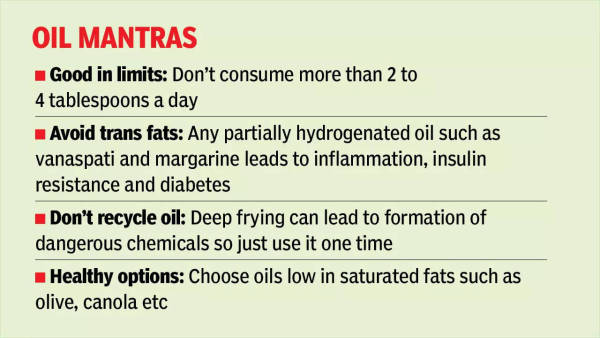'Reusing oil increases risks. There should be guidelines for street food'

Prime Minister Narendra Modi has urged people to cut down on their oil consumption by 10% in a bid to combat India’s obesity epidemic.
Dr Vijay Surase, senior interventional cardiologist at Jupiter Hospital, Thane tells
Lata Mishra how excessive oil intake not just leads to obesity, but also raises risks of lifestyle disorders like heart disease and diabetes across age groups.
How much cooking oil is too much?
An adult should consume between two and four tablespoons of oil per day — depending upon one’s age, sex and level of physical activity — in order to get essential fatty acids. Cooking oils are calorie-rich and promote fat storage in the body, especially those with saturated fats and trans fats. Over time, excessive intake leads to energy imbalance, and the body stores more fats than it burns. Also, high unhealthy fats in oil may cause hormonal imbalances that interfere with appetite regulation, leading to the vicious loop of overeating and weight gain.
Apart from obesity, what other health risks does excess oil intake pose?
High saturated fats in palm oil, coconut oil and ghee reduce good cholesterol and elevate the levels of LDL (bad cholesterol) — which causes the formation of plaque in the arteries, narrowing and hardening them (known as atherosclerosis) — and increases chances of heart attacks and strokes. Partially hydrogenated oils have trans fats that lead to inflammation, insulin resistance, and higher risks of metabolic disorders like type 2 diabetes. One must use healthy cooking oils like olive oil, mustard oil, canola oil or sunflower oil as these are relatively low on saturated fats. Avocado oil, olive oil and flaxseed oil contain monounsaturated fats and omega-3 fatty acids that support more effective blood sugar management and healthier heart functions.
Indian households have a habit of reusing oil for frying. Is it safe?
Repeated use of cooking oil leads to the formation of dangerous chemicals such as acrolein, aldehydes and free radicals that increase the trans fats in the oil and causes oxidative stress which, in turn, leads to inflammation, insulin resistance and heart diseases. In the long run, impurities formed in recycled oil can lead to disorders of the gastrointestinal tract, neurological problems and even cancer. It’s always better to use fresh oil for deep frying.
 How does the high oil content in street food and fried snacks like samosas, pakoras and puris contribute to lifestyle diseases?
How does the high oil content in street food and fried snacks like samosas, pakoras and puris contribute to lifestyle diseases?
Fried foods are a staple in Indian diets, but have a number of calories, unhealthy fats and excessive sodium. The high oil content in such foods contributes to weight gain, the trans fats in the oil causing insulin resistance, high cholesterol and inflammation. If consumed in excess, these foods can lead to lifestyle diseases like type 2 diabetes, hypertension and heart disorders. One must limit intake, if not stop having them altogether, for better health.
India has set limits on trans fats in packaged foods, but should there be stronger regulations on how street vendors and restaurants use oil?
That would be a victory for public health as most street foods are cooked in reused oils that are sure to have a lot of trans fats and oxidative damage. Govt can help by setting strict standards for the quality of oil, limits on reuse, and encouraging the use of healthier oils. Improved regulations on oil use and educating street vendors to adopt healthier cooking methods will bring about a marked improvement in the nutritional quality of street food, thereby reducing health risks for the population which consumes it.
 What health benefits will an average Indian household get over time if its oil consumption is cut by 10%?
What health benefits will an average Indian household get over time if its oil consumption is cut by 10%?
There can be very significant health benefits in the long run. For instance, reduced oil consumption will lower the intake of unhealthy fats, leading to better weight management and reduced risks of obesity. It can also lead to better blood lipid profiles, with lower LDL cholesterol and triglycerides that would reduce the risk of heart disease. It would also improve insulin sensitivity and reduce the risk of developing type 2 diabetes. The family, as a whole, may experience better digestion, improved metabolic health, and reduced risks of lifestyle diseases associated with diets that are heavy on oil consumption.
 Prime Minister Narendra Modi has urged people to cut down on their oil consumption by 10% in a bid to combat India’s obesity epidemic.
Dr Vijay Surase, senior interventional cardiologist at Jupiter Hospital, Thane tells
Lata Mishra how excessive oil intake not just leads to obesity, but also raises risks of lifestyle disorders like heart disease and diabetes across age groups.
Prime Minister Narendra Modi has urged people to cut down on their oil consumption by 10% in a bid to combat India’s obesity epidemic.
Dr Vijay Surase, senior interventional cardiologist at Jupiter Hospital, Thane tells
Lata Mishra how excessive oil intake not just leads to obesity, but also raises risks of lifestyle disorders like heart disease and diabetes across age groups.

